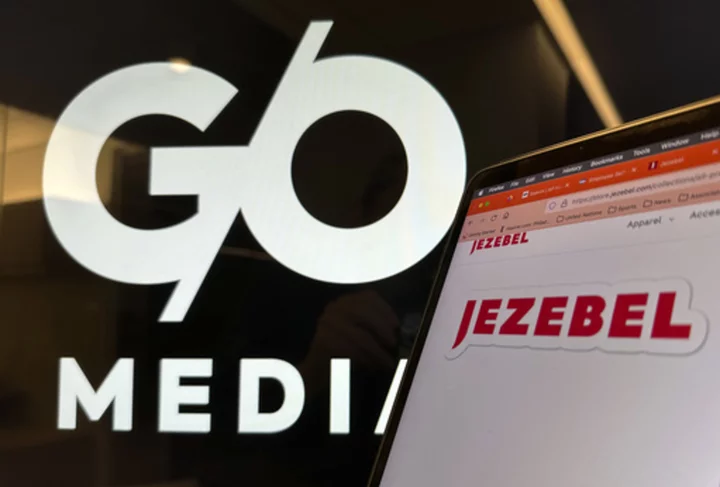NEW YORK (AP) — Jezebel, the sharp-edged feminist website that found an impassioned and devoted following at the height of the blogosphere era but ended up struggling with its business model, is shutting down after 16 years, its parent company announced Thursday.
It is the latest gender-focused media site to fold as the media industry struggles with plummeting digital advertising that has also cut into the profitability of major tech companies from Google to Facebook. Bitch Media, which had a print magazine, website and podcast, closed last year after 25 years, citing sustainability. The Washington Post folded The Lily, its freestanding publication on gender an identity issues, into its main website last year.
G/O Media said 23 staffers would be laid off, including Jezebel's team, as part of a restructuring to cope with economic headwinds and a difficult digital advertising environment. The New York-based company also announced the departure of G/O Media editorial director Merrill Brown.
Launched in 2007 by Gawker Media, Jezebel established itself as an influential voice in feminist commentary years before the explosion of the #Metoo movement pushed issues of gender and power to the forefront of mainstream media coverage. The website combined searing commentary on gender politics with edgy pop culture coverage to build a audience craving an alternative to the frothy fashion magazines that dominated the landscape of media targeted at women.
‘THE REAL PRAGMATIC EXPERIENCES OF WOMEN’S LIVES'The website appealed to readers because it combined style with serious news and commentary, said Kate Cox, program director for Poynter’s Leadership Academy for Women in Media. It covered political issues like abortion but gained the most buzz with its takedowns of celebrity culture and the fashion industries, helping make subjects like “body shaming” and “rape culture” part of the national discourse.
“It was totally unprecedented. Their blend of pop culture along with whip-smart writing made it a daily read,” Cox said. “It took women’s issues out of a niche brand and embraced the real pragmatic experience of women’s lives. It captured the dynamic but also captured the despair and the hard swallow and the cheeky energy that the women I knew at the time had."
In a recent essay for the New Yorker, Jezebel's founding editor-in-chief, Anna Holmes, wrote that launching Jezebel was a “once-in-a-lifetime opportunity” to create a women’s media website at a time when she “was disillusioned by the state of America’s women’s media.”
“I wanted it to combine wit, smarts, and anger, providing women — many of whom had been taught to believe that “feminism” was a bad word or one to be avoided — with a model of critical thinking around gender and race which felt accessible and entertaining,” Holmes wrote.
She also reflected on Jezebel's collision with social media, which blurred the lines between Jezebel's content and the public commentary of its most devoted followers.
“I see Jezebel not as the beginning of the end of the digital-media era but as a moment — a spark — within an ongoing discussion about gender politics," she wrote.
Cox said the demise of Jezebel and other feminist publications is more a reflection of the challenge of finding a sustainable revenue model for digital media sites, especially mission-driven ones, rather than a declining appetite for stories centered on gender. She noted that the Supreme Court's ruling overturning Roe v. Wade has only deepened interest in such coverage.
PROBLEMS WITH THE BUSINESS MODELIn a memo to the company, G/0 Media CEO Jim Spanfeller said he made the “very, very difficult decision to suspend publication of Jezebel” after an unsuccessful search for a buyer for the website. The search, Spanfeller said, was launched because it became clear that the parent company’s “business model and the audiences we serve across our network did not align with Jezebel’s.”
Cox said that statement hinted at difficulties of attracting advertisers to sites like Jezebel, which attract a loyal audience but also court controversy that scares off mainstream advertisers. She pointed to “The 19th,” a new gender-focused nonprofit newsroom that relies on a mix of membership, philanthropy and corporate underwriting as potentially successful model.
Jezebel writers blamed the shutdown on the parent company “strategic and commercial ineptitude," criticizing its leadership for its failure to search for a business model more suitable to Jezebel's mission and audience.
“The closure of Jezebel also underscores fundamental flaws in the ad-supported media model where concerns about ‘brand safety’ limit monetizing content about the biggest, most important stories of the day,” the writers said in a statement released by their union, WGA East.
Jezebel became part of the G/0 Media portfolio in 2019, along with Gizmodo, Quartz, the Onion and the Root. Its shutdown follows years of tension with G/0 leadership.
Jezebel’s interim Editor-in-Chief Laura Bassett resigned in August, accusing G/O in a tweet of failing “to treat my staff with basic human decency.” Jezebel’s current editor-in-chief, Lauren Tousignant, wrote in a post on X, formerly Twitter, on Thursday that she is angry and sad about the shutdown and would have more to say later.
Rich Juzwiak, a senior writer for Jezebel, said he enjoyed the freedom that came with writing for Jezebel, where he was encouraged to follow his instincts. But he said there was an increasing sense that the site and the parent company had misaligned priorities.
“I don’t think that this was inevitable,” Juzwiak said of the closing. “It was like, do you even know what you bought?”









